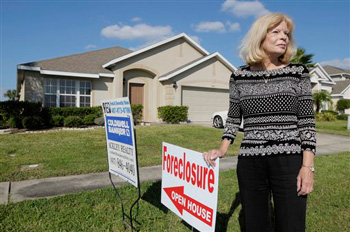
Did last month's 'foreclosure freeze' cool down or heat up the real estate market? Just over a month ago, most US states agreed to a freeze on foreclosures in response to suspected flawed practices by lenders. Apparently, certain lending officials were 'robo-signing' foreclosure documents. They were signing off on foreclosures without reading the information. The moratorium got mixed reviews from icy stares to warm welcomes.
Out in the Cold
Of course, some US home owners were left out of the loop altogether when it came to the foreclosure freeze. In early October, Bank of America, JP Morgan Chase, and Ally Financial (parent of GMAC Mortgage) said that they would suspend foreclosures to investigate 'robo-signing' – but not in every state. For example, Texas foreclosures were not on the list for review.
Uncertain Future
When these major lenders announced their intentions, they included 'judicial foreclosure' states. Texas has 'judicial foreclosures' (foreclosures carried out by the state) and non-judicial foreclosures. Therefore, Texas was not part of the voluntary suspension.
As a result, many Texas home owners were uncertain about the entire process. They were advised to contact their lenders but flawed foreclosures did not have to be frozen in this state. Robert Gleason, Director of Governmental Affairs, commented on the uncertainty that faced Texas home owners.
"Many homeowners will have to wait until next year to be able to see if this pause on foreclosures affected their home values, but in the current market, it is a possibility," says Robert Gleason, Director of Governmental Affairs.
Hot Market
If a home owner was involved in a conventional sale (not a foreclosure or short sale), the freeze might have freed up more possibilities. Keep in mind that foreclosures had been responsible for up to 30% of all sales in certain areas. With foreclosed properties off the market, conventional sales faced less competition.
Foreclosure sales in Tampa Bay, Florida, fell 9.3% in October. In an interesting but not surprising twist, conventional sales experienced an identical (9.3%) increase. Tampa Bay figures were repeated in varying degrees across the country.
The foreclosure freeze heated up conventional sales. Yet the moratorium did not change everything in the home seller's favor. House prices did not increase to benefit home sellers. Actually, prices for conventional sales were 2.2% lower than in October 2009.
Cold Comfort
As well, a few home sellers ran into additional problems with the foreclosure freeze. They sold their home with the hopes of moving in elsewhere. In specific cases, their new house was tied up in the moratorium. Home sellers could make quick sales during the freeze. Moving in, however, took longer than expected in the aftermath of the 'robo-signing' fiasco.
Cooling Down
In addition, the foreclosure freeze had a downside on various levels. The longer a home just sits there, the less value it has, and the more detrimental effect on home values in the neighborhood. Besides decreasing prices, the freeze cooled more than one person's enthusiasm for the market.
Potential home buyers entered up in a quandary. Some buyers have been caught 'in the process' of buying for more than a year. Home buyers have discovered that it is not always easy to buy a home. Especially in the autumn chill caused by the foreclosure freeze!
How Has The Foreclosure Freeze Affected You?
Image courtesy of technews.tmcnet.com